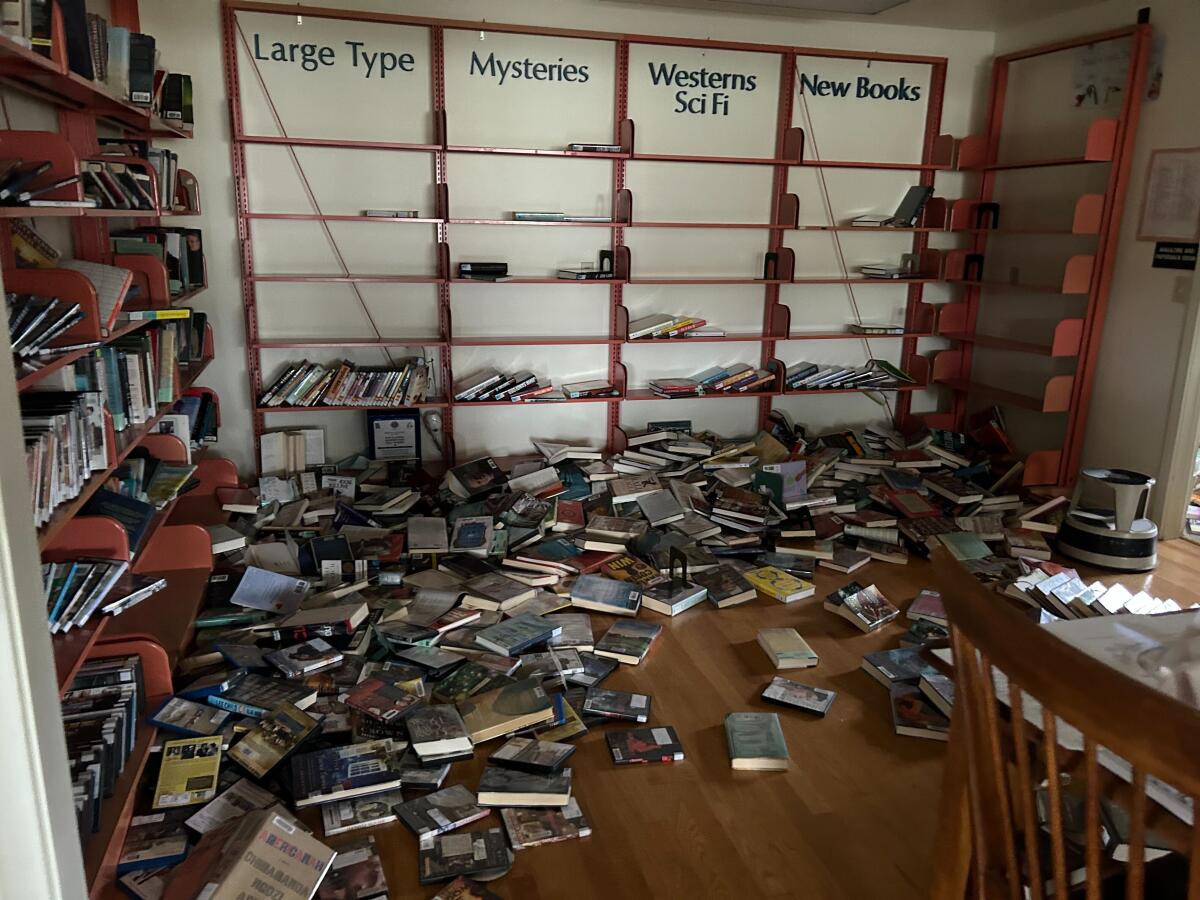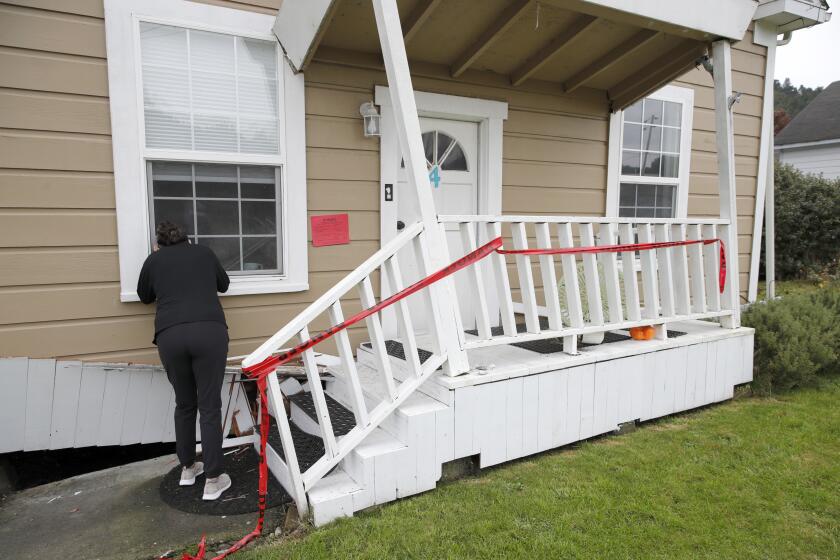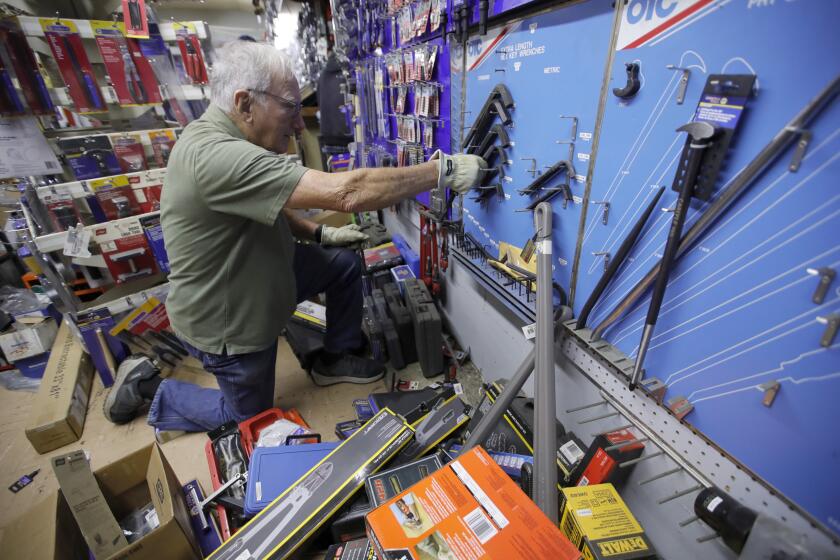‘Living here isn’t easy to begin with.’ How an earthquake brought people together

I woke Tuesday morning to a phone call from my editor before 8 a.m. — earlier than usual — with the kind of assignment you can’t plan for.
There had been an earthquake. A big one. Could I drive five hours north from my home in Sacramento to Humboldt County? Now?
I rushed to pack a bag, shoveling in phone and laptop chargers, a notebook and pens and business cards to prove I am who I say I am. I opened my map app and typed in Fortuna — a historic logging town, population 12,000 — that I hadn’t been to in my eight years of living in California.
I didn’t have time to do much research but knew it was a magnitude 6.4 quake that led to two deaths, 11 injuries and the closure of a bridge over the Eel River. I knew that people had gone to bed the night before with a very different life than they woke up to.
What I didn’t know was that a new place would feel so familiar and that the reporting would be easy because of that sense of community. This coastal county, about 55 miles from the Oregon border, surrounded by giant redwoods, reminded me of my hometown in West Virginia, at the heart of Appalachia.
Both are regions defined by a connection to nature, fading 20th century industries and people who are resilient as hell.
When I arrived in Fortuna just before 2 p.m. — after a long, winding drive that included a snowy detour through the Shasta-Trinity National Forest that only God and my GPS can explain — I pulled into the first restaurant I saw. Double D Steak & Seafood was closed but full of people cleaning up broken bottles of liquor and wine — the smell hit you in the face.
Earthquake adds to hardships for some Northern California residents while others quickly bounce back.
Most of the folks helping weren’t employees but volunteers: The owner’s son had gotten his buddies to help sweep and take out the trash. The owner, wearing a camouflage Santa hat despite being awake since 3 a.m., welcomed me in and showed me the dining room that days prior had been readied for holiday cheer, now filled with shattered ornaments, crooked photos and a toppled Christmas tree.
It was my first glimpse of a town that had been wrecked by nature but was full of people helping one another get through the crisis while grasping for a shred of normalcy.
At a vintage shop down the street, I felt my first aftershock, which made an antique chandelier sway. I’ve never experienced a big earthquake and wondered what we should do. I was struck by the owner’s nonchalance.
“Oh, that’s a tremor. We should probably go outside,” said Heather Herrick, owner of the Haute Hoarder boutique, taking a break from cleaning up shards of glass.
By the end of my first day there, though, I understood being underwhelmed by an aftershock. I was exhausted, at one of the few hotels in town that had power restored but was still without water. I was too tired to care about the slight swaying in the middle of the night. I let the tremor rock me to sleep.
I’m always surprised by people who are willing to let journalists into their lives on the worst days. People were without sleep, power or water. They couldn’t stay warm or charge their phones. They didn’t know if insurance would cover the damages. Motorists lined up to panic-buy gas. All of the grocery stores were closed.
Yet no one turned me away or scolded me for intruding, even as I was questioning people who’d been left homeless in an instant. One person always led me to another.
“Is this Mackenzie with the L.A. Times?” a text read. It was Kevin Mcniece, a friend of Herrick, who had told him I was in town, and he wanted to show me his house that had been split into three pieces, caught fire and condemned by local officials. He had lost most of his belongings and was staying in a hotel. For free.
“Riding on the coattails of generosity,” as he put it. He wanted to share his story.
A family who’d been sleeping in their car introduced me to their pit bull, Sarah, when I ran into them at at a pop-up food bank. A woman who’d taken refuge at the fire department started crying while telling me that someone had offered to buy her family a hotel room for the night.
Volunteer firefighters and food-bank workers assembled. It made me think of that quote attributed to Mister Rogers that doubles as good reporting advice. In times of disaster, he said, “look for the helpers. You will always find people who are helping.”
::
Parts of Humboldt County that were hit hardest, including the towns of Scotia, Ferndale and Rio Dell, seemed much like where I grew up.
In West Virginia, we don’t have earthquakes, but we have floods. Instead of old lumber-company towns, we have remnants of a once-booming coal mining industry.
Both places have immense natural beauty and are home to people who struggle with poverty but are proud of where they’re from. They are places rightfully leery of outsiders but astoundingly welcoming.
In this part of California, like West Virginia, communities are tight-knit in part because they believe no one else is coming to help them. I sensed a relatable frustration with feeling overlooked and misunderstood.
But I knew I wasn’t one of them. I was there for only two days. All I could do was listen. I always asked about more than the earthquake: What’s this place usually like? What do people get wrong about it?
“The more densely populated areas tend to speak for all of us,” Mcniece told me. “The Bay Area and Los Angeles and Sacramento — they get to be the face of what California has on its mind, but over here behind the redwood curtain, we have different needs.”
No stranger to hardship in an economy sustained mostly by the dairy and timber, Ferndale and Rio Dell residents are accustomed to relying on one another.
Whether they lost a few dishes or entire homes, people tended to stay positive. This wasn’t their first earthquake, and it probably won’t be their last.
“Living here isn’t easy to begin with,” Rio Dell resident John Ireland said. “When something bad does happen, people come together. You get to see the best sides of people.”
It wasn’t an easy place to file a news story. I didn’t have power to charge my laptop. Cellphone service is spotty on a good day. When the sun set, the already quiet town of Fortuna was silent, pitch-black and difficult to navigate.
Lacking a reliable internet connection, I had to file a story the old-fashioned way, calling from my car a co-writer who transcribed my notes and plugged them in. I filed another story from the McDonald’s in Eureka. (Great WiFi.) On the drive home Wednesday evening, I pulled over in dark and foggy Lake County and pleaded with the initially reluctant owners of a hotel to let me use their internet despite not being a guest. (Shout-out to the Lodge at Blue Lakes.)
When I got back to Sacramento, where I normally cover state government and policy, I was thankful for seeing a part of California that reminded me of my hometown nearly 2,500 miles away.
I was thinking about the Scotia Lodge, a 100-year-old hotel that was somehow mostly unscathed by the earthquake, even as destruction was visible all around it. The owners of the lodge rushed to take in the displaced. By the end of the week, they were back up and running, and the rooms were filled with both paying tourists and community members staying for free, nowhere else to go.
Aaron Sweat, the lodge’s chief executive, told me about a family visiting from Europe who were so alarmed by the earthquake that they fled Scotia in a rush. When a gas station wouldn’t accept their international credit card, a local stepped in to pay and refused to take cash in return.
“I guess in times of tragedy, Humboldt, and all these small, rural towns everywhere, just come together and say, ‘Let’s figure this out,’” Sweat said.
On Facebook, the lodge let concerned locals know that the place was still standing.
“This isn’t the first time, nor the last, that this old gal will be put to the test by Mother Nature,” the post read.
The historic building, sturdy and welcoming, was a surprising sight. But it gave me a feeling that was achingly familiar.
More to Read
Sign up for Essential California
The most important California stories and recommendations in your inbox every morning.
You may occasionally receive promotional content from the Los Angeles Times.











